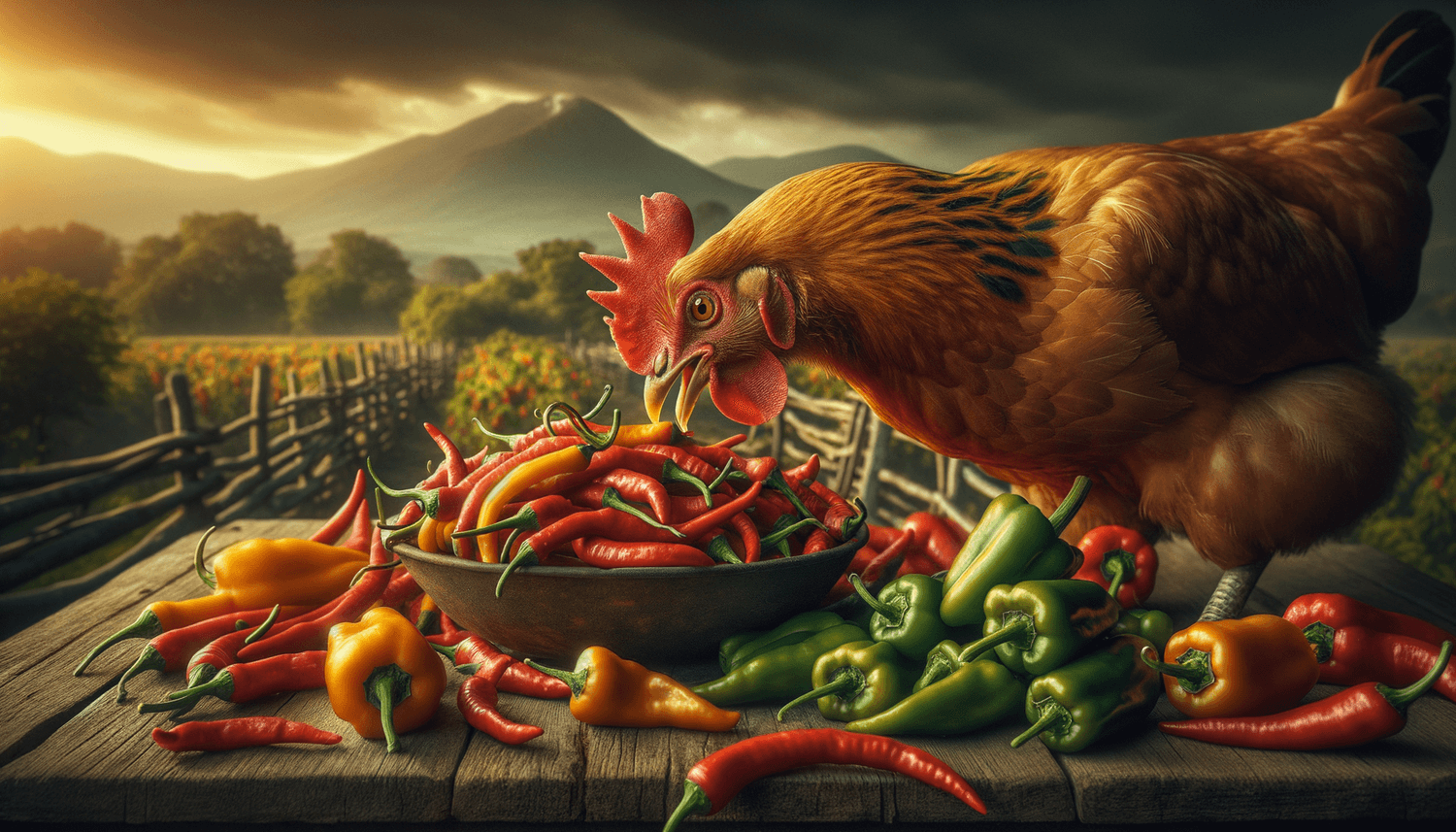Are you harboring a burning question about your feathery flock’s diet? Have you asked yourself, “Can my beloved cluckers handle the heat of spicy peppers?” Well, you’re in luck! In this fun and flavorful blog post, we’ll dive into the fiery world of hot peppers and our backyard friends. Join us as we explore if chickens can eat hot peppers, the importance of a balanced diet, the benefits and risks of consuming those spicy delights, their nutritional value, and how to safely incorporate them into your chickens’ meals!
Can chickens eat hot peppers?
Yes, chickens can eat hot peppers, and it is safe for them to do so. The heat component in peppers, capsaicin, does not affect chickens because they lack the receptors to feel the ‘spicy’ sensation. In fact, hot peppers can even have some health benefits for your feathered friends, such as providing essential nutrients and natural antibacterial qualities.
A balanced diet for backyard chickens
Just like humans, chickens need a balanced diet to thrive and stay healthy. Providing your flock with the necessary nutrients is crucial to their overall well-being and productivity. A chicken’s diet should primarily consist of high-quality chicken feed, which should make up around 80-90% of their diet. Chicken feed is nutritionally complete and specifically formulated to meet their needs, ensuring they remain in tip-top shape.
The remaining 10-20% of their diet can be made up of treats, such as fruits and vegetables. These tasty nibbles not only add variety to their menu but also offer additional health benefits. However, it’s essential to keep these treats in moderation, as too many extras can lead to an unbalanced diet and potential health issues. By offering a well-rounded and balanced diet, you’ll keep your flock happy, healthy, and filled with energy!
Nutritional value of hot peppers for chickens.
Feeding hot peppers to chickens can actually prove to be quite beneficial in terms of nutritional value. Hot peppers are packed with various vitamins, minerals, and antioxidants, which can boost the overall health of your flock. One of the most notable vitamins found in hot peppers is vitamin C, an essential nutrient playing a role in maintaining a healthy immune system and assisting with iron absorption. In addition, vitamin A can be found in hot peppers, which contributes to better skin and feather development and improved vision.
Besides vitamins, hot peppers contain minerals such as calcium, potassium, and manganese. These minerals play vital roles in maintaining strong bones, controlling fluid balance, and aiding metabolic processes in your chickens’ bodies. On top of these benefits, hot peppers have a high water content, allowing them to impart hydration to your birds, especially important during hot summer months.
As an added bonus, the capsaicin found in hot peppers is a natural antibacterial agent, which might help to keep harmful bacteria in check within your flock’s environment. When it comes to their nutritional value, hot peppers offer several advantages that can contribute positively to the well-being of your backyard chickens.
Nutrition table of hot peppers for chickens.
| Information | Description |
|---|---|
| Nutritional Value | Rich in vitamins (A and C), minerals (calcium, potassium, and manganese), antioxidants, and capsaicin. |
| Suggested Serving Size | Small amounts as an occasional treat, making up no more than 10-20% of their overall diet. |
| Safe Feeding Practices | Monitor your chickens’ reaction to new foods, and avoid feeding them spoiled or moldy peppers. |
| Preparation | Wash and cut hot peppers into smaller pieces, removing seeds if desired – although they are safe for chickens to eat. |
| Potential Risks | Overfeeding can lead to dietary imbalances and reduce overall feed intake; always focus on providing a balanced diet. |
| Hydration | Hot peppers have high water content, which can help in keeping chickens hydrated, especially during hot weather. |
| Digestion | Chickens can easily digest hot peppers, although large quantities may affect the appearance of their droppings. |
| Seasonal Availability | Hot peppers are typically available during the summer months and are a great seasonal treat. |
| Other Benefits | Capsaicin acts as a natural antibacterial agent, which may help control harmful bacteria in the environment. |
Tips for introducing hot peppers to your flock
Introducing hot peppers to your chickens’ diet should be done in moderation to ensure their well-being. You can start by offering small quantities of hot peppers along with their regular feed. Keep an eye on your flock to see how they react to the treat, and gradually increase or adjust the amount accordingly. If you notice any negative reactions or changes in their behavior, consider removing hot peppers from their diet and consult a veterinarian for advice.
What types of hot peppers can chickens eat?
Chickens can safely consume a variety of hot peppers, ranging from mild to spicy varieties. This includes jalapeños, serranos, cayenne, and even habanero peppers. However, it is crucial to remember that the heat factor doesn’t bother chickens but might impact their droppings. As always, moderation is key when introducing any new food item.
Storing and freezing hot peppers
If you find a range of hot peppers in season and wish to store them for future use, you can preserve their freshness by properly washing, drying, and freezing them. Store the peppers in an airtight container or plastic bag, and then freeze. When you’re ready to treat your chickens, thaw the peppers at room temperature and cut them into small pieces. This will allow you to provide your chickens with a healthy and nutritious treat throughout the year.
Alternatives to hot peppers
If you’re looking for alternative treats for your chickens, consider offering treats like berries, leafy greens, squash, or melons. Regardless of the treat chosen, always remember to ensure your chickens maintain a balanced diet with their staple chicken feed as its foundation.

















